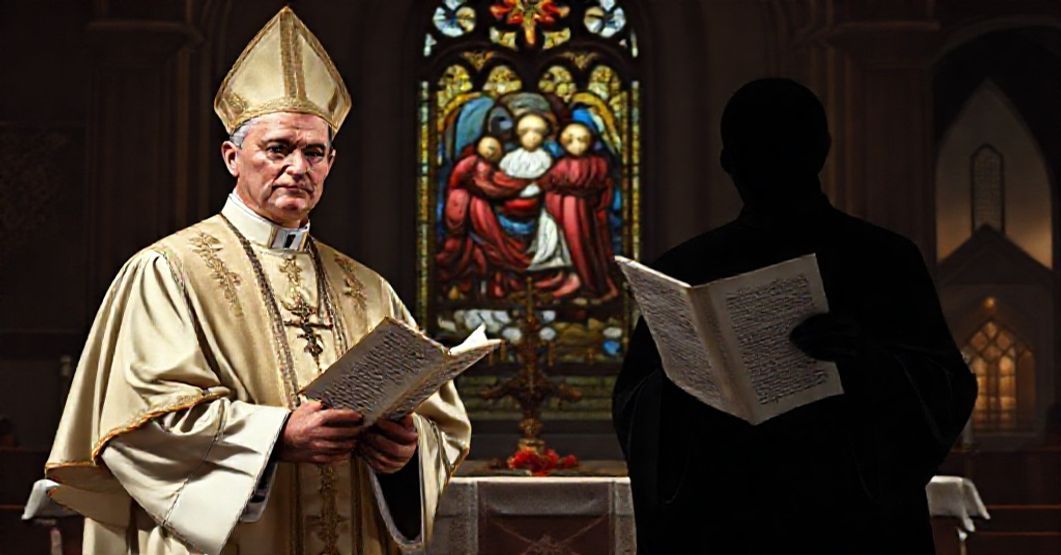Compromised Doctrine: Neo-Church’s Weak Defense of Marriage Against Modern Revolt
The Neo-Church’s Feeble Defense of Marriage Exposes Its Doctrinal Bankruptcy
Catholic News Agency (November 17, 2025) attempts to explain why the “Catholic Church prohibits ‘gay marriage'” while revealing the conciliar sect’s theological incoherence. The article cites the post-conciliar Catechism and “professor” John Grabowski to defend marriage as “a partnership between a man and woman ordered toward procreation.” Yet this defense crumbles under scrutiny when measured against the immutable teaching of Pope Pius XI’s Casti Connubii (1930): “Any use whatsoever of matrimony exercised in such a way that the act is deliberately frustrated in its natural power to generate life is an offense against the law of God and of nature.”
A Watered-Down Catechism Replaces Dogmatic Clarity
The article references the 1992 Catechism‘s vague definition of marriage as “a partnership of the whole of life” while omitting its dangerous novelty: the claim that homosexuals “must be accepted with respect, compassion, and sensitivity” (CCC 2358). Contrast this with the Syllabus of Errors (1864) condemning the proposition that “the Church ought to adapt herself to contemporary liberal civilization” (Proposition 80). The conciliar sect’s refusal to denounce homosexual acts as “intrinsecus inhonestum” (intrinsically dishonorable) – per Pius XI’s Casti Connubii – demonstrates its apostasy from Catholic moral theology.
“Gay marriage is thus a misnomer in the Church’s understanding,” Grabowski claims, yet he teaches at an institution recognizing antipopes as legitimate. This pseudo-defense ignores how the neo-church’s own 2014 Synod demanded “welcoming homosexual persons” while attacking those who “insist only on issues of abortion or marriage” (Relatio Synodi 55).
Natural Law Betrayed by Pastoral Pragmatism
Bishop Robert Barron’s 2017 suggestion to abandon legislative efforts against “gay marriage” constitutes direct rebellion against Pius IX’s condemnation of those who say “the Church ought to be separated from the State, and the State from the Church” (Syllabus of Errors, Proposition 55). The article’s praise of this approach exposes the conciliar sect’s surrender to moral relativism – precisely what Pius XII warned against when declaring: “That which does not correspond to truth or to the norm of morality objectively has no right to exist, to be spread, or to be activated” (Ci Riesce, 1953).
Grabowski’s appeal to John Paul II’s “spousal meaning of the body” theology rings hollow when Wojtyła himself kissed the Quran (1999) and hosted pagan rituals at Assisi (1986). This is the same modernist who declared in Familiaris Consortio (1981) that irregular unions might contain “constructive elements” – a heresy directly condemned by the Council of Trent’s anathema against those who claim “the sacraments of the New Law do not contain the grace which they signify” (Session VII, Canon 6).
The Silent Apostasy of Omissions
Nowhere does the article mention:
- The dogmatic definition of marriage as a sacrament by the Council of Trent (Session XXIV)
- Pius XI’s condemnation of civil “marriage” contracts without sacramental validity (Casti Connubii)
- Pius XII’s teaching that states must “conform to the dictates of Christian conscience” in marriage laws (Allocution to Midwives, 1951)
This silence proves the neo-church’s complicity in the globalist agenda. As Quas Primas (1925) declares: “When once men recognize, both in private and in public life, that Christ is King, society will at last receive the great blessings of real liberty, well-ordered discipline, peace and harmony.” By refusing to demand Christ’s social reign, the conciliar sect betrays its role as “columna et firmamentum veritatis” (1 Timothy 3:15).
Conclusion: From Doctrine to Apostasy
The feeble arguments presented reveal the conciliar sect’s complete assimilation of revolutionary principles. As St. Pius X warned in Pascendi (1907), modernists reduce dogma to “symbols of faith representative of the religious sentiment” (Part 1). Until the Vatican occupiers are recognized as antipopes and sacramental life restored in true Catholic communities, such “defenses” of marriage remain theater masking apostasy. “Lex orandi, lex credendi” – the neo-church’s Novus Ordo liturgy and invalid sacraments have borne their poisoned fruit in this doctrinal collapse.
Source:
CNA explains: Why does the Catholic Church prohibit ‘gay marriage’? (catholicnewsagency.com)
Date: 17.11.2025
